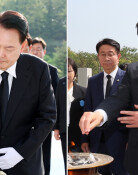[Editorial] Our North-Bound Students
The Ministry of Unification issued permission two days ago to visit North Korea for 357 members of Hanchongryun, a pro-North Korean college students association, who want to attend an inter-Korean college students meeting. Hanchongryun echoed the Norths argument in a draft joint declaration which it publicized in advance: Let us eliminate anti-unification pro-war forces which intend to cast fire clouds of a nuclear war on the heads of Koreans. The tone and terms used are the same as the Norths. There is not a single mention of the North Korean nuclear program. North Korean students even demanded to stop joint military exercise of foreign forces in their discussion material. It is fair to say that they intend to hold a pro-North Korea, anti-U.S. competition rather than a meeting of college students.
The Supreme Court of Korea has ruled twice that Hanchongryun is a group benefiting the enemy. However, the Unification Ministry evasively said, We permitted their visit to the North because they will go there under the name of another organization (The June 15 College Student Movement Association). The ministry allowed Hanchongryun leaders to go to the North last year, citing that it was a visit by individuals. Ignoring the law and the rulings of the Supreme Court is a denial of the legitimacy of the Republic of Korea.
Moreover, Hanchongryun is nothing more than a minor force in college which represents a stupid leftists. In particular, after being founded last year, the June 15 College Student Movement Association made it clear that it is following the North Korean regime, saying, We will make this year the first year of the withdrawal of U.S. forces in Korea. North Korea and the Unification Ministry are the only ones which approved the group as the representatives of college students.
The reason that Pyongyang can raise its voice despite the fact that it survives thanks to South Koreas support is that the South Korean government strives not to anger Pyongyang. The North once rejected reporters who accompanied Unification Minister Lee Jong-seok who visited Gaesong. The claimed reason was some reporters had used the term abductees to North Korea. It also suspended tours to Mt. Geumgang last year, demanding that Hyundai Group change its management. But it has successfully sought profits by attending inter-Korean meetings when rice and fertilizer were badly needed.
Hanchongryuns argument is reminiscent of the emotional slogan chanted shortly after the April 19 Student Uprising in 1960 by some college students who wanted to hold an inter-Korean college students meeting, saying, Come to the South, Lets Go to the North. The Unification Ministry is overlooking this and being swayed by the slogan of between Koreans. Under these circumstances, how can the public trust the governments North Korea policy?







